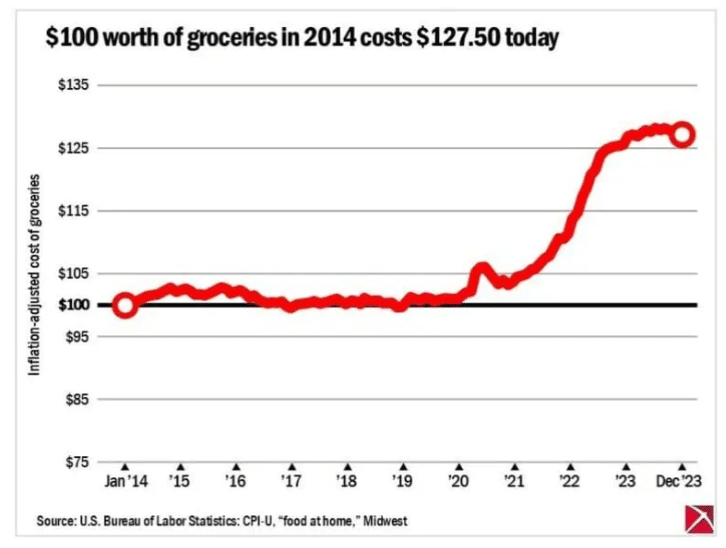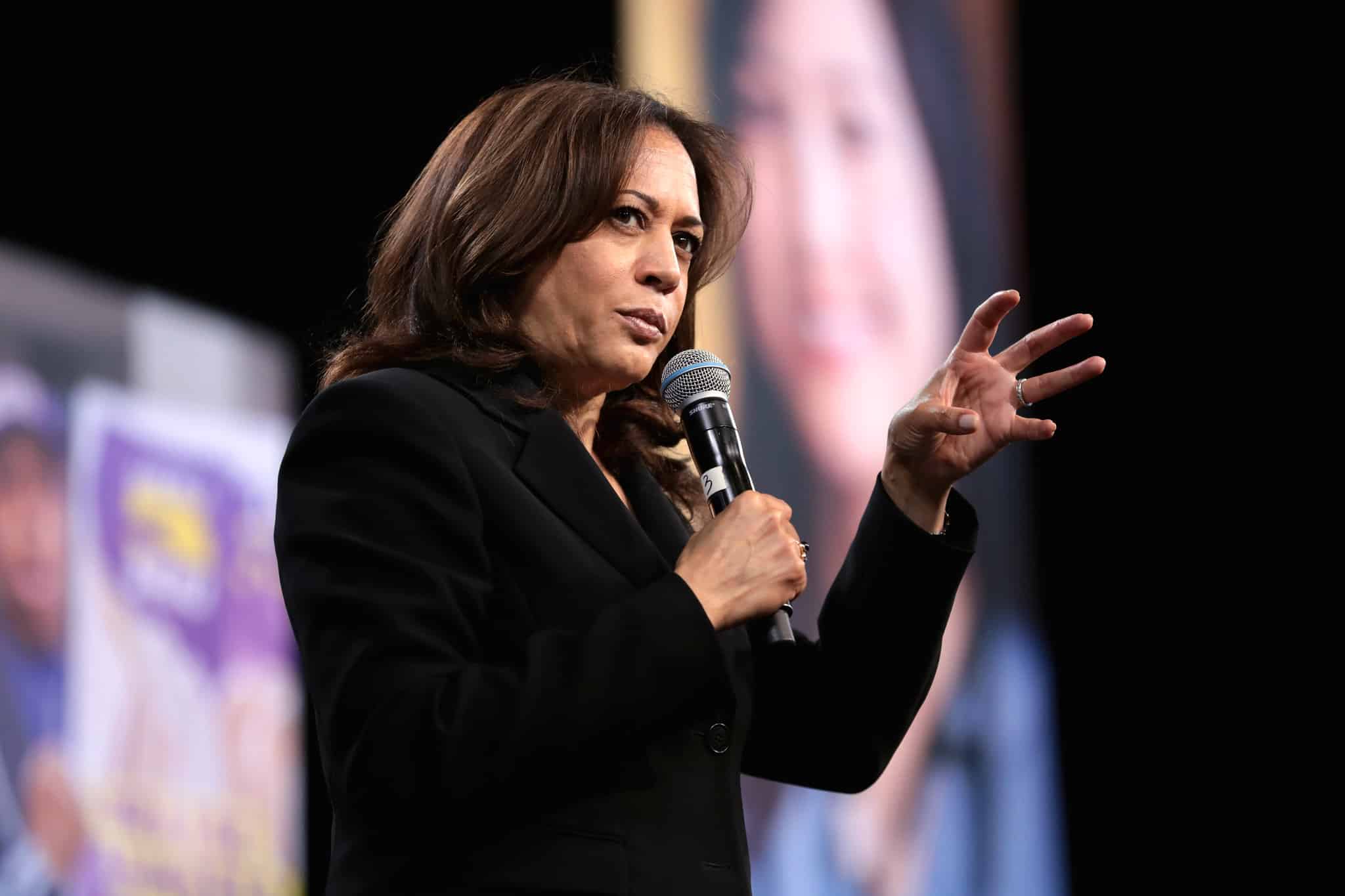A new economic proposal has been voiced by the Democratic presidential candidate Kamala Harris this week that aims to address one of the most pressing concerns for American consumers – rising grocery prices.
According to recent comments from Harris, she would seek to implement a federal ban on “corporate price gouging” if she is elected President in November in a move that would mark a significant escalation in the party’s approach when it comes to the country’s economics.
The Proposal: A First-Ever Federal Ban on Food Price Gouging
According to a statement released by the Harris campaign, the vice president intends to push for “the first-ever federal ban on price gouging on food and groceries.” This proposal aims to set “clear rules of the road to make clear that big corporations can’t unfairly exploit consumers to run up excessive corporate profits on food and groceries.”
Also read: What A Kamala Harris Presidency Might Mean for US Stocks and Businesses
While the exact details of the plan are yet to be fully disclosed, the campaign has outlined several key components of this bold proposal:
- A federal ban on price gouging specifically targeting the food and grocery industries.
- Enhanced powers for federal authorities to enforce the ban.
- Harsh penalties for firms that violate the new limits on price gouging.
- Implementation within the first 100 days of a Harris administration.
The proposal is part of a broader economic agenda that Harris plans to unveil during a speech in Raleigh, North Carolina. This agenda also includes plans to lower prescription drug costs and address housing affordability.
What Exactly is Price Gouging?
One of the challenges in implementing such a ban is defining what constitutes price gouging. While the Harris campaign has not provided a specific definition, experts suggest that it could resemble existing state-level laws.
Niko Lusiani, director of the corporate power program at Roosevelt Forward, explained to ABC News that price gouging typically consists of companies that exploit sudden imbalances between supply and demand to indiscriminately hike the price of their products.
He cited the example of a water company that dramatically increases prices during a natural disaster.
Currently, 37 states have some form of price gouging laws on the books. These laws vary in their approach and the definition of what exactly price gouging is can be a bit vague. Meanwhile, others do specify numerical thresholds for price increases that are directly considered a violation of the law.
Harris’s proposal comes at a time when inflation remains a top concern for voters. While inflation has fallen significantly from its peak, consumers are still facing prices that are roughly 20% higher than they were before the Biden administration took office.
Grocery Prices Have Surged by More Than a Quarter in the Past 5 Years
Grocery prices in particular have been a critical issue for Americans as they have risen 26% since 2019 according to Elizabeth Pancotti, director of special initiatives at the Roosevelt Institute.
Also read: What Would a Kamala Harris Presidency Mean For Crypto?
Harris’s campaign has pointed to the disconnect between production costs and consumer prices as a justification for the proposed ban. According to the campaign’s official statement on this subject, “big grocery chains that have seen production costs level off have nevertheless kept prices high and have seen their highest profits in two decades.”
This view is supported by data from a Federal Trade Commission (FTC) study released in March that revealed a surge in grocery retailers’ profit in 2021 and an even higher increase two years later, even after price increases started to cool.
Some critics and pundits lazily call Hariss’ proposal “communism” or “soviet-era price controls” while others point to the relatively low margins of grocery store chains to make it seem like there is little price gouging in the food industry. However, they are often simply looking in the wrong direction. For example, 2 of the top food brands in the country, Cal-Maine Foods and Kraft-Heinz, had their margins skyrocket in recent years. Many companies realized that they could use very real baseline inflation to excuse unnecessary price hikes and many executives openly discussed the practice on earnings calls.
Harris is reportedly targeting food and grocery conglomerates whose margins are…ahem…not small. https://t.co/MmQu84rJ45 pic.twitter.com/n8zcGvismH
— David Sirota (@davidsirota) August 15, 2024
While the specifics of the proposal are still not publicly available, it appears that the FTC will play a pivotal role in enforcing this proposed ban. Campaign officials working for Harris have indicated that the agency could impose “harsh penalties” on companies that ignore these controls and break the limits established by these rules. Instead of passing a wide ranging bill that directly controls the prices of a large swath of consumer goods, Harris would likely empower the FTC to make sure companies like Kraft-Heinz with tremendous margins aren’t shaking down Americans.
Harris has stated her intention to enact the ban within her first 100 days in office. However, it’s important to note that such a significant policy change would likely require legislative action, which could result in challenges depending on whether lawmakers agree or not with this approach and move the bill up the ladder.
Biden and Trump Have Not Been This Aggressive

Harris’s proposal represents a departure from both the Trump administration’s approach and even goes beyond the measures taken by the Biden administration thus far. While Biden’s White House has talked about price gouging and launched initiatives like the Strike Force on Unfair and Illegal Pricing, it has not proposed a federal ban of this nature.
The proposal draws inspiration from existing state-level price gouging laws. Lindsay Owens of Groundwork Collaborative, an anti-monopoly think tank, notes that 34 states have some form of anti-price gouging law. These laws have been used effectively in some cases, such as when New York settled with Walgreens over allegations that it inflated baby formula prices during a shortage in 2022.
Some progressive economists and consumer advocates have expressed support for Harris’s proposal. Owens, for example, stated: “It’s wonderful to see the vice president unleash a suite of policy proposals to crack down on these cheaters and protect Americans’ pocketbooks.”
On the other hand, conservative-leaning economists have expressed skepticism about the effectiveness and wisdom of such a policy. Brian Riedl, a senior fellow at the Manhattan Institute, characterized the proposal as a “return to the lazy, failed economic policies of the 1970s, when price controls proved to be a disaster for the economy.”
Also read: Trump & Harris Propose “No Taxes on Tips” – Here’s What They Don’t Tell You
Economists are divided on whether such a ban would effectively control price increases and benefit the economy. Some argue that such a measure could assist the federal government in knee-capping corporations that leverage their market power to raise prices excessively. However, another group contends that it could create burdensome regulations that might ultimately raise prices or have other unintended affects for consumers.
Joe Brusuelas, chief economist for RSM US, expressed his concern about an outright ban but supported moderate measures that could deter price hikes such as expanded government oversight of corporate practices.
Harris Gears Up to Unveil Her Agenda for the Economy
In addition to the price gouging ban, Harris is expected to announce plans for 3 million new-construction housing units and a $25,000 credit for up to 1.4 million first-time home buyers. These proposals build upon and expand the housing plans that were previously introduced by President Biden.
Harris’s economic proposals come as she seeks to differentiate herself from both President Biden and former President Trump. While she is seemingly fostering continuity with many of Biden’s policies, she also appears to be staking out a more aggressively populist stance on economic issues.
The Trump campaign has already criticized Harris’s economic record. A campaign spokesperson named Karoline Leavitt stated: “Under Kamala Harris, everything costs 20 percent more than it did under President Trump… America cannot afford another four years of Kamala’s failed economic policies.”
Vice President Kamala Harris’s proposal for a federal ban on price gouging in the food and grocery industries represents a bold step in Democratic economic policy.
While it aims to address very real concerns about rising consumer prices, the proposal has ignited a debate among economists and policymakers about its potential effectiveness and long-term economic impact.
As the 2024 presidential campaign heats up, Harris’s economic agenda will likely face intense scrutiny from both supporters and critics. The success or failure of this proposal could have significant implications not only for American consumers but also for the broader debate about the role of government in regulating markets and protecting consumers from corporate excesses.
